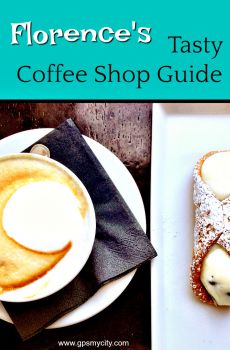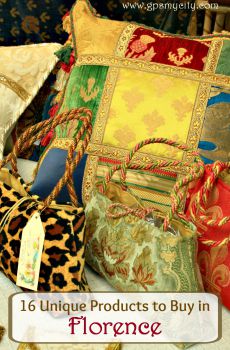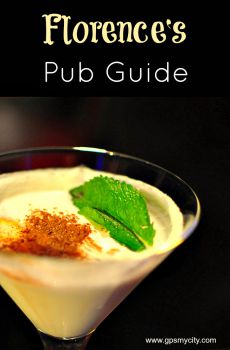Cenacolo di Fuligno (Fuligno Museum: "Last Supper" fresco), Florence
The "Last Supper" fresco by Pietro Perugino, is the centerpiece of the refectory, now museum, of the former Convent of Fuligno, which originally had housed Clarissan nuns since 1419. The fresco was "discovered" and open to the public in the 19th century. Initially credited to Raphael – a student of Perugino, whose early style bears striking resemblance, it was later recognized as a creation by Perugino himself.
The remarkable piece depicts Jesus and the apostles at a horseshoe-shaped table, seated on a continuous bench with the back upholstered in green. The exception, as usual, is Judas Iscariot, who is on the other side of the table, painted (from behind) semi-turned towards the viewer. The inscriptions on the wooden step, at the base of the table, indicate those present (from the left), namely: James the Lesser; Philip; James the Greater; Andrew; Peter; Jesus; John; Bartholomew; Matthew; Thomas; Simon the Canaanite; and Judas Thaddeus (aka Judas of James or Judas Lebbeo, not to be confused with Judas Iscariot).
The floor has a geometric squared design in white and pink marble taken from the tablets of San Bernardino, also an early work by Perugino. The scheme recalls Ghirlandaio's "Last Supper of San Marco" (1486), with the scene set around a U-shaped table and the landscape opening of the room beyond the back. The upper part of the painting features a vast loggia resembling real architecture of the refectory, as if breaking through the wall, where you can see three spans of round arches supported by pillars with grotesques; while in the background there is a vast natural landscape, in which the scene of the prayer takes place, in the garden of Gethsemane. Typical of the artist are the slender little trees dotting the hills and the landscape fading towards the horizon in blue tones, due to the haze.
Great harmony transpires from the relationships between figures and setting, and each element here attracts the viewer towards the escape of the landscape opening in the center. In the frame, which imitates an ancient marble motif, also in keeping with the Florentine tradition, are some tondi with portraits of saints.
Tip:
Before planning your visit, please ensure to check the status of the site as it may be temporarily closed.
The remarkable piece depicts Jesus and the apostles at a horseshoe-shaped table, seated on a continuous bench with the back upholstered in green. The exception, as usual, is Judas Iscariot, who is on the other side of the table, painted (from behind) semi-turned towards the viewer. The inscriptions on the wooden step, at the base of the table, indicate those present (from the left), namely: James the Lesser; Philip; James the Greater; Andrew; Peter; Jesus; John; Bartholomew; Matthew; Thomas; Simon the Canaanite; and Judas Thaddeus (aka Judas of James or Judas Lebbeo, not to be confused with Judas Iscariot).
The floor has a geometric squared design in white and pink marble taken from the tablets of San Bernardino, also an early work by Perugino. The scheme recalls Ghirlandaio's "Last Supper of San Marco" (1486), with the scene set around a U-shaped table and the landscape opening of the room beyond the back. The upper part of the painting features a vast loggia resembling real architecture of the refectory, as if breaking through the wall, where you can see three spans of round arches supported by pillars with grotesques; while in the background there is a vast natural landscape, in which the scene of the prayer takes place, in the garden of Gethsemane. Typical of the artist are the slender little trees dotting the hills and the landscape fading towards the horizon in blue tones, due to the haze.
Great harmony transpires from the relationships between figures and setting, and each element here attracts the viewer towards the escape of the landscape opening in the center. In the frame, which imitates an ancient marble motif, also in keeping with the Florentine tradition, are some tondi with portraits of saints.
Tip:
Before planning your visit, please ensure to check the status of the site as it may be temporarily closed.
Want to visit this sight? Check out these Self-Guided Walking Tours in Florence. Alternatively, you can download the mobile app "GPSmyCity: Walks in 1K+ Cities" from Apple App Store or Google Play Store. The app turns your mobile device to a personal tour guide and it works offline, so no data plan is needed when traveling abroad.
Cenacolo di Fuligno (Fuligno Museum: "Last Supper" fresco) on Map
Sight Name: Cenacolo di Fuligno (Fuligno Museum: "Last Supper" fresco)
Sight Location: Florence, Italy (See walking tours in Florence)
Sight Type: Religious
Guide(s) Containing This Sight:
Sight Location: Florence, Italy (See walking tours in Florence)
Sight Type: Religious
Guide(s) Containing This Sight:
Walking Tours in Florence, Italy
Create Your Own Walk in Florence
Creating your own self-guided walk in Florence is easy and fun. Choose the city attractions that you want to see and a walk route map will be created just for you. You can even set your hotel as the start point of the walk.
In Galileo's Footsteps
Galileo Galilei-born in Pisa in 1564-spent much of his life in and around Florence, where some of the most defining moments of his revolutionary career unfolded. A genius of many talents-physicist, mathematician, astronomer, inventor-he helped usher in the scientific revolution and reshape humanity’s understanding of the universe. Florence, the cradle of the Renaissance, became a backdrop for... view more
Tour Duration: 3 Hour(s)
Travel Distance: 8.0 Km or 5 Miles
Tour Duration: 3 Hour(s)
Travel Distance: 8.0 Km or 5 Miles
Medici Landmarks Walking Tour
The Medici family helped to establish Florence as the single most important art capital of Renaissance Europe. In order to prove wealth and power, they built numerous palaces, libraries, churches, chapels and personal residences. The Medicis were big lovers of art and they acquired huge, expensive collections, as well as supporting many sculptors and painters of the time.
Designed by... view more
Tour Duration: 1 Hour(s)
Travel Distance: 2.7 Km or 1.7 Miles
Designed by... view more
Tour Duration: 1 Hour(s)
Travel Distance: 2.7 Km or 1.7 Miles
Florence Introduction Walking Tour
Florence was founded in 59 BC by Julius Caesar as a settlement for his veteran soldiers. Laid out like a Roman military camp, its main roads intersected at what is now the Republic Square. Originally named Fluentia, referencing its location between two rivers, the city later adopted the name Florentia, meaning “flowering” or “flourishing”.
And flourish it did. During the Middle Ages and... view more
Tour Duration: 2 Hour(s)
Travel Distance: 4.1 Km or 2.5 Miles
And flourish it did. During the Middle Ages and... view more
Tour Duration: 2 Hour(s)
Travel Distance: 4.1 Km or 2.5 Miles
Michelangelo's Masterpieces Walking Tour
Though born in the small Tuscan town of Caprese, Michelangelo spent over two decades of his life in Florence-the heart of the Renaissance. It was here that he grew up, was educated, and began shaping his artistic voice, eventually creating some of the most iconic masterpieces the city has ever known.
His larger-than-life work-“David”-didn’t just reshape the image of biblical heroism-it... view more
Tour Duration: 2 Hour(s)
Travel Distance: 4.0 Km or 2.5 Miles
His larger-than-life work-“David”-didn’t just reshape the image of biblical heroism-it... view more
Tour Duration: 2 Hour(s)
Travel Distance: 4.0 Km or 2.5 Miles
Florence Food Tour
Food is one of the great Florentine passions, and the great thing about having a delicious authentic Tuscan meal, a snack, delicatessen, or a quality gelato here – besides the abundant variety – is not having to spend a lot of money for it.
In general, the “osterias” and the eateries nestled in Sant’Ambrogio Market will offer cheaper and more casual food with an emphasis on home... view more
Tour Duration: 2 Hour(s)
Travel Distance: 2.6 Km or 1.6 Miles
In general, the “osterias” and the eateries nestled in Sant’Ambrogio Market will offer cheaper and more casual food with an emphasis on home... view more
Tour Duration: 2 Hour(s)
Travel Distance: 2.6 Km or 1.6 Miles
Dante's Florence Walking Tour
Dante Alighieri was arguably the greatest – albeit also most controversial – of Italy's poets. After having served as one of the six priors governing Florence, his political activities – including the banishing of several rivals – led to his own banishment, upon which he wrote his masterpiece, “The Divine Comedy”, as a wanderer, seeking protection for his family in one town after... view more
Tour Duration: 1 Hour(s)
Travel Distance: 2.1 Km or 1.3 Miles
Tour Duration: 1 Hour(s)
Travel Distance: 2.1 Km or 1.3 Miles
Useful Travel Guides for Planning Your Trip
Florence's Tasty Coffee Shop Guide
The caffe scene throughout Italy is an important factor of everyday life. People will pop in to their favorite bar on their way to work for a quick espresso breakfast with a pastry, they’ll grab a slice of pizza for lunch or drop by for an aperitivo before dining out and take a peaceful digestivo...
Souvenir Shopping Guide: 15 Unique Products to Buy in Florence
Compared to other Italian "grands" like Rome, Venice, or Milan, Florence is relatively less-known to an outsider for any local products, save, perhaps, Florentine mosaics and Fiorentina FC. Fortunately, there are tonnes of locally-originated things that this Italian city is rightfully...
Top 13 Pubs in Florence
Florence, the city of art and beauty has no problem in mastering the art of the nightlife as well. Local pubs are very popular and appreciated among the Florentines and the tourists. Locals and native English speakers that study or live in the city cannot wait to welcome tourists in their cozy...












